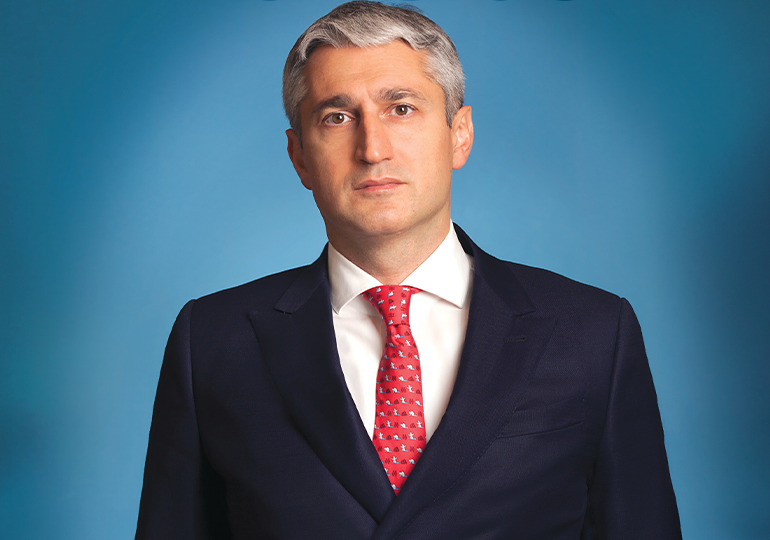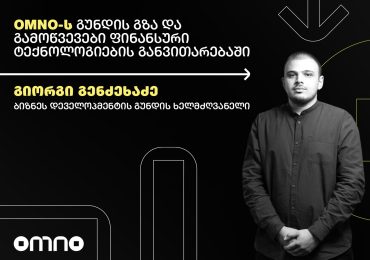When business clients face a challenge, they can rely on TBC and Giorgi Tkhelidze for support.
Once the pandemic is over, our main leadership test will come in the form of feedback from our clients, and whether or not they will say that we were and always will be their main supporters,” Deputy CEO of TBC Giorgi Tkhelidze says with a smile. After a long time, we finally managed to meet face-to-face again at the TBC office on Marjanishvili Street.
I can only tell by his eyes that he is smiling, as we both wear face masks. It is a seemingly organic moment against the background of this interview and the message sent out by Georgia’s leading bank: uncertainty remains, but we have considerably more experience and more ways of eliminating it now than last summer, when the bank’s management was discussing the pandemic and the ways of adapting to it with Forbes.
We have other priorities today. We need to ensure that TBC manages to retain stability in the relationship with its partners and chooses the right leadership style. We now know that the pandemic is more unruly and long-lasting than we initially thought.
At the time of writing this cover story, devaluation of the national currency continues at a record pace.Last year, the current account deficit of Georgia doubled and reached 12% of GDP, the economy shrunk by 6.2%, more than 100,000 people found themselves below the poverty line, and more than 75,000 citizens lost their jobs. Without going deeper into negative statistics, we can see that the health crisis is closely being followed by an economic crisis.

For Georgia’s small open economy, the aforementioned figures are truly alarming. In the context of banks representing the main source of funding in Georgia, and TBC being a systemically important bank, there are two important questions that we need to ask Giorgi Tkhelidze.
First, when can we expect the economy to recover? The Deputy CEO of TBC believes that “in this regard, we have not yet felt the full effects of the pandemic. The reality is that last year’s expectations about slowing the pandemic and achieving tourism recovery have been delayed. Therefore, it will also take the economy longer to recover.”
Giorgi Tkhelidze’s response does not come as a surprise to those who regularly follow the reports published by TBC Bank and the forecasts of various financial organizations. Based on these forecasts, the 2021 economic recovery figures may seem large against the background of last year’s record lows. In reality, it will take the economy at least until the end of 2022 to reach pre-pandemic levels.
Even from the figures posted by TBC we can clearly see, on the one hand, the bank’s resilience in the current difficult environment, and on the other hand, the way in which the development of systemically important banks and economic recovery are interconnected. In the fourth quarter of 2020, TBC posted figures of GEL 14 billion in net loans, GEL 22 billion in assets, and GEL 123 million in end-of-year net profit. “The growth was not as substantial as in 2018 and 2019, but we still issued GEL 2.2 billion to corporate businesses alone,” Mr. Tkhelidze notes. TBC remains the market leader in terms of growth.
Even during the crisis, businesses were issued with funds, including new money for the implementation of both ongoing and new projects. The Deputy CEO of TBC sees the cooperation between the banking system, the National Bank of Georgia, and the Georgian government as key to maintaining these dynamics. “We listened to each other and conceived a joint action plan. This partnership continues to the present day.”
According to international credit rating agencies, the Georgian banking system is functioning well even during the pandemic – most recently, at the end of March, the international credit rating agency Fitch revised the outlook of TBC and two other Georgian commercial banks from ‘negative’ to ‘stable.’ At the same time, the rating agency affirmed TBC’s long-term Issuer Default Rating (IDR) at ‘BB-’. According to the statement published by Fitch, “the revision of the outlook to ‘stable’ reflects reduced pressure on the bank’s credit profile from the pandemic and contraction of the Georgian economy. Fitch expects the bank’s pre-impairment profits to be sufficient to absorb additional credit losses from the pandemic without jeopardizing the bank’s financial profile. TBC entered the crisis with healthy capital cushions and sound performance metrics.”
As we can see, the main risks are related to economic growth as well as the ability of companies and people to service their debt.
The second question is what is the role of Georgia’s leading commercial bank in this process? Giorgi Tkhelidze divides his response into three parts.
“One of the main roles of the bank is to provide support with regards to financial liabilities. We have agreed to restructure debt on several occasions,” states the Deputy CEO, who is responsible for the corporate segment. Looking at this particular segment, we can see that the bank’s pandemic-related concessions for its corporate clients affected loans worth GEL 2.1 billion (37% of the total portfolio) and 252 borrowers (34% of all debtors).
“When the pandemic is over, decision making and long-term planning will become much easier, but right now we must think about the ways to operate in the current reality – how to work with our colleagues remotely, how to supply remote services to our clients if they face difficulties, how to ensure that businesses can adapt to the current reality, continue to operate and retain their staff,” Mr. Tkheladze explains.
“We listened to each other and conceived a joint action plan. This partnership continues to the present day.”
When it comes to the subject at hand, TBC has an interesting approach and philosophy. According to Giorgi Tkhelidze, it is important not to spend too much time thinking about when the pandemic will be over, and instead think more about the ways to adapt to the current situation and continue operating. This means that for TBC, it is important to support businesses both in good times, when they generate profits, and in challenging times, when they most need help. TBC is therefore willing to take more risks and then work with businesses on risk management, rather than take the easy route of refusal.
A good example is Lopota. “Goga Maisuradze explained to us that it would be important for his loyal guests to see that ongoing projects were not being suspended. “‘Lopota does not stop’ is an excellent slogan that could be used in the future,” Giorgi Tkhelidze recalls. As a result, Lopota will be able to greet its guests with renovated tennis courts, a new restaurant and 51 additional hotel rooms this year. “It is better to show more belief in these situations, take risks and prove real partnership in difficult times,” Mr. Tkhelidze states.
Lopota is only one of numerous examples. The list of businesses that were started or expanded in 2020 with TBC’s support include two Nova megacenters in Tbilisi and Batumi, where TBC contributed GEL 1.5 million, and two new Bomondi hospitals in Poti and Kobuleti. TBC also contributed GEL 10 million to Georgian Textile – a sportswear enterprise in Rustavi that exports its products abroad. With TBC’s help, companies were able to manufacture products such as face masks during the crisis – Medifari and New Technology Impex obtained funding for this purpose during the pandemic. This list is far from complete.
TBC is also working closely with the government. It sponsored the 112th session of the Executive Council of the UN World Tourism Organisation. As the leading financier of tourism in Georgia, the bank decided to provide funding at needs-oriented and flexible terms for this sector, which was hit particularly hard by the pandemic, to ensure that when activity in the sector finally restarts, its players are ready and able to operate without hindrance. All forecasts confirm that Georgia’s economic recovery depends primarily on the fortunes of the tourism sector. TBC has provided a total of GEL 130 million in funding for the hospitality industry.
Thus, supporting businesses in difficult times is not only an emotional matter for TBC, but also a pragmatic business decision made by the market leader. “30% is emotion, and 70% is a business decision. If you do not take appropriate risks and then work with businesses to exit the crisis, it means that you are actually deepening that crisis. The welfare of businesses and banks is interconnected, especially in the medium-term. If you do not help businesses overcome challenges, then the crisis could also engulf the bank,” Giorgi Tkhelidze explains.
The National Bank of Georgia, in their role as regulator, ensures that systemically important banks do not take excessive risks. This forms the second part of Mr. Tkhelidze’s response to my question.

The Deputy CEO of TBC views the bank regulation policy positively, effectively admitting that NBG’s conservative approach towards market regulation before the pandemic, for which it was often criticized, has a positive effect during the crisis with regards to bank capitalization and liquidity. “NBG will probably feel proud of itself for a long time,” Giorgi Tkhelidze remarks, and I can once again detect a smile behind his face mask as he recalls how thoroughly the National Bank and TBC discussed the responsibilities of large borrowers: “Corporate loans are the least problematic, as we pursued adequate lending policies. We had capital buffers to establish additional reserves for insuring crisis-related risks.” According to Mr. Tkhelidze, the financial system of Georgia is still capable of overcoming minor shocks, although uncertainty remains a major challenge.
This is the third and final part of Giorgi Tkheladze’s response. In his view, an important part of the role and responsibilities of TBC as a leading company is providing its partners with professional advice and sectoral or macroeconomic analysis in times of uncertainty: “We regularly talk to our clients, and these talks can be difficult and intense. Difficult situations often require correct but painful decisions, but we remain realistic. Apart from providing financial services, we also act as advisers and experts. Our analytical and consistently updated reports allow us to do that. Together with our partners, we create realistic expectations based on joint discussions that lead to correct decisions.” Such is Mr. Tkhelidze’s firm position.
Being the market leader clearly helps TBC with situational analysis, as approximately 90% of businesses are TBC clients. The company has collected countless data on sales, turnover and dynamics in individual sectors and the economy as a whole. This information is collectively analyzed in TBC’s weekly public reports. “If we detect recovery dynamics or signs of life in a project, then we continue supporting it, as well as funding new projects,” Giorgi Tkhelidze explains.
TBC has also implemented the practice of holding regular webinars about COVID-19 and the macroeconomic outlook. According to Giorgi Tkhelidze, while the situation can change from one webinar to another (at times quite radically), the question/answer format creates a more complete picture, reducing uncertainty and making the prospect of adapting to the pandemic appear more realistic.
TBC also understands that the pandemic is a global threat.The bank ensures that its best practices and examples are far more diverse than just those on the local market. Sharing them during the pandemic can be priceless. For that reason, the bank even invited international management consultants for a three-hour session with Tegeta. “They wanted to conduct a detailed analysis to find out what the best global practices were, what kind of mistakes are made and by whom, and how to correctly plan and re-adjust the business model to ensure that businesses can adapt to the existing situation. They gathered plenty of good ideas,” Mr. Tkhelidze says about Tegeta. The same was the case with the hotel business.
Hospitality and entertainment are the worst affected sectors today – the hotel and restaurant sector shrank by almost 40% in 2020, while the arts, entertainment and leisure sector shrank by 19%. “From what we can see, only a small part of the sector is able to function. During the summer, this segment will be able to service the interest on their debt at best. As for the rest, we are just waiting for a more active period to get them on their feet,” Giorgi Tkhelidze tells me.
Real estate and related sectors have been able to better adjust to the pandemic – partly due to the state subsidy program, partly due to infrastructure projects, and partly through their own efforts. This sector shrank by 5%. “If the situation becomes more stable, this sector will be able to continue functioning,” says Mr. Tkhelidze.
Luckily, there are also sectors that have been relatively unaffected by the crisis or were only affected for a short period of time. Examples include trade, supermarkets, pharmacies, and wine export.
Using TBC’s own clients as an example, Giorgi Tkheladze boldly predicts that business will emerge stronger from the pandemic. Notably, he includes TBC Bank in this prediction. Analysis of several clear trends gives him cause for optimism.
First, the pandemic will provide additional impetus for companies to either diversify their products or achieve more cost-effectiveness in supplying these products. Giorgi Tkhelidze cites delivery service as a specific example. “Delivery services completely transformed everything. This concerns not only food, but also many other products and services. As a result, companies with good reputation and brand recognition no longer need to pay high prices in city centers. They can easily rent a space further away for a tenth of the price, set up a kitchen and start delivering,” Giorgi Tkhelidze explains. “There are several such companies on the market already, while several others have turned this approach into their development strategy. Most of these businesses have managed to retain a large section of their staff thanks to delivery services.”
Secondly, there is growing demand for data analytics, which encourages companies to be more transparent. Giorgi Tkhelidze also provides specific examples for this: “For instance, supermarkets and hotels are actively exchanging data. We now produce such data and supply them to a growing number of companies. Demand is growing, which is good. The next stage will be for companies to start producing and analyzing this data themselves, and we will gladly help them in this process,” Mr. Tkhelidze states.
“It is better to show more belief in these situations, take risks and prove real partnership in difficult times.”
Thirdly, the digitization process will continue. “We are actively working with NBG to enable digital signatures. This will save a lot of paper and time for customers and banks alike – time that can be used for other beneficial endeavors,” says Giorgi Tkhelidze.
Fourthly, the culture of online meetings will become more prevalent. “In early 2020, nobody at TBC could imagine holding even a five-person meeting online,” Mr. Tkhelidze recalls. “You had to beat the traffic to get from Ateni Street to Marjanishvili Street, or vice versa. This culture has significantly increased efficiency. Many meetings now take place remotely, and that will still be the case when this pandemic is over.”
This concerns not only internal meetings, but also business meetings – even the most conservative Georgian businessmen are now ready to solve at least some of their issues online. The picture is not so one-sided when working from home. According to a recent survey, 74% of TBC employees view remote work positively, as it has raised their quality of life and happiness. However, when work-related activities have to be conducted in the same space where children are being raised, and when it becomes harder for colleagues to communicate and exchange advice, online work becomes more time and energy consuming. “We are grateful, and at the same time, we are thinking about how to resolve this issue moving forward,” says Giorgi Tkhelidze. At this point, TBC provides all its employees who wish to work remotely with that opportunity. According to the current statistics, approximately 20-25% of staff choose to work from the office.
The final observation is that the pandemic seems to have erased borders by strengthening online channels. TBC Bank knows this better than others. Giorgi Tkhelidze recalls an interesting story: “The husband of one of our team members was assigned to a diplomatic mission in South Korea. She had to follow her family and could no longer remain at TBC. We were in the process of saying goodbye when we raised the opportunity of working part-time. Our employee agreed, but things worked out so well that by the end of December we concluded that she was working full time, only remotely. Many clients do not realize that this person is providing them with service from abroad unless she tells them.” Hearing this story from Giorgi Tkhelidze has a special ring to it. Several years ago, when he was offered a high position at TBC, he had to choose between staying at Barclay’s in London or moving back home. If it was not for his desire to return home, he might have taken a different decision. Today, the choices are different. It is no longer necessary to be in Georgia to work here, if you can successfully work remotely. At least, that is the approach adopted by TBC. It will allow the bank to significantly increase its efficiency and access to professionals.
One of the lessons learned by Giorgi Tkhelidze personally, and one he was willing to share with Forbes Georgia, is that while fighting the effects of the pandemic, when the bank managed to retain its staff despite revenue losses, when it had to focus on continuing to provide non-stop services to its clients, and when it devised plans for working online, it was running increased risk of paying less attention to what was happening inside the team that enabled all of this – how the TBC employees were coping with the stress of having to adapt to the changing environment and practices. “In recent months, we actively began to ensure that resources can be added wherever they are needed, and that we constantly express our gratitude to let everyone know that results are achieved by the whole TBC team, rather than the management alone.”
Looking ahead to the future, what should be done in 2021 and beyond to ensure that the economy starts to recover, and businesses start to function fully? The Deputy CEO of TBC has a detailed response to this as well.
Giorgi Tkhelidze believes that the time is right for real development of the capital market. According to him, this is important in two respects – first, there must be an option to place savings not only in bank accounts, but also in other sources – especially since the interest rates on foreign currency deposits in the Georgian banking system are showing a declining trend at a time when76% of total deposits of natural persons (GEL 18.7 billion) and 45% of total deposits of legal persons (GEL 16.9 billion) are placed on foreign currency accounts. Secondly, loan liabilities increase during a crisis, as either profitability decreases, or the volume increases due to devaluation, or both. Thus, the parameters of many companies will no longer be able to meet the additional borrowing requirements, and access to alternative sources of funding will be needed more than ever. “A partnership between NBG and the financial sector already exists in this regard, which is reflected in the additional benefits of an alternative source of funding for companies with a high credit rating, resulting in a more active debt capital market. This must be supplemented with state resources,” states Giorgi Tkhelidze, highlighting pension savings in this context. However, this is a different issue for a different article.
As for the short and medium-term, Mr. Tkhelidze believes that only a speedy vaccination process can be a turning point. “If the third wave affects a large number of people and restrictions have to be reintroduced, we will be unable to receive tourists,” Giorgi Tkhelidze states, adding that it is important for as many people as possible to be vaccinated, at least in the industries that cannot function without people’s physical involvement.
The Deputy CEO of TBC firmly believes that the crisis will be followed by significant growth, as artificially restrained sectors will ultimately grow faster than under normal circumstances. “It is important to position Georgia as an attractive proposition for investors,” says Giorgi Tkhelidze, who represents the bank that has for years prioritizedGeorgia’s position on the London Stock Exchange.
I believe that we have managed to convey one example of what leadership can look like, including during the post-pandemic period. The next step will be to measure the verdict of the business sector – will it say that TBC was its main supporter in difficult times?
We will be waiting to find out!















